Linnea Tanner's Blog, page 33
November 14, 2021
Rave Review Book Club Discounted Membership Drive #RRBC @RRBC_RWISA
Hello, friends!
Today is your lucky day! I am proud to be a three-year member of the RAVE REVIEWS BOOK CLUB and for the next 48 hours (11/15 through 11/17) there is a $25 discount on any membership tier when you join the club!
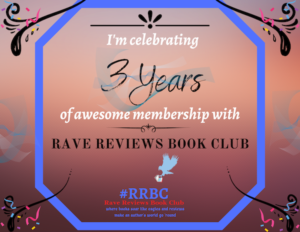
We aren’t just an organization where you add your name to our roster, and then you disappear. We are the club that supports our members in numerous ways! Here are just a few…
-We purchase, read, and review our fellow member books that are listed in the catalog.
-We promote our fellow members and their books on social media, just as hard as we promote ourselves.
-We promote our members with interviews via our RAVE WAVES Talk Radio Shows for RRBC members only. Books are always being purchased during those interviews!
-We keep our fellow members lifted and promoted even when they can’t promote themselves (in the event of personal emergencies, illness, etc.)
-We have a hard-working Tweet Support Team, promoting our members and their books daily.
-At RRBC, we believe that “each one should teach one,” therefore, we don’t compete against each other. We lift as we climb.
There are so many more awesome ways that being a member of RRBC has benefitted me. One of their programs is a contest in which you must draft, edit, and publish a short story in 90 days. As a challenge this year, I entered the RRBC ALPHA / OMEGA 90-DAY SHORT STORY WRITING CONTEST, which, to my surprise, I was announced as the grand prize winner for Two Faces of Janus. The RRBC organization and fellow authors have inspired me to write in other forums such as poetry and short stories in addition to writing novels.
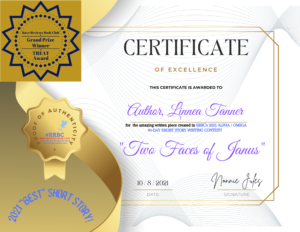
Do you have questions? Just ask me!
RRBC is such a fun place to belong! We’re not just about books, you know, we’re also about making beneficial connections and lifelong friendships!
Today, Monday, 11/15 through Wednesday, 11/17 are our Recruitment Days and when you join, please list my name on your membership application as the person who referred you, as I’ll get a special prize! You can join here > RaveReviewsBookClub.wordpress.com/rrbc-join-renew
If you have specific questions regarding membership, please reach out to Paula, our Club Personal Asst! She’s a whole lot of awesome!
I hope to see you on the other side of membership soon and your books in the catalog!
Thank you for sharing this page to your social media platforms for me!
November 10, 2021
Heidi Eljarbo Hidden Masterpiece Coffee Pot Book Club Blog Tour #HistoricalFiction #HistoricalMystery #DualTimeline #BlogTour #CoffeePotBookClub #solihansenmysteries @HeidiEljarbo @maryanneyarde
Welcome to The Coffee Pot Book Club Blog Tour for author Heidi Eljarbo that is being held from November 1st – November 12th, 2021. She is the author of the Historical Mystery (Duel Timeline), Hidden Masterpiece (Soli Hansen Mysteries, Book 3), which was independently released by the author on 15th September 2021 (260 pages).
Below are highlights of Hidden Masterpiece, Heidi Eljarbo’s author bio, and my review of your book.

To follow the blog tour, CLICK Tour Schedule Page
HIGHLIGHTS: HIDDEN MASTERPIECE
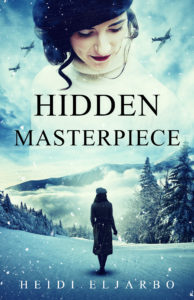
Hidden Masterpiece
(Soli Hansen Mysteries, Book 3)
By Heidi Eljarbo
In this riveting third book in the Soli Hansen Mysteries series, a woman’s courage to follow her conviction during a horrible war leads her to the portrait of a young Jewish heiress painted three centuries earlier.
Norway 1944. Art historian Soli Hansen has gone undercover to rescue masterpieces and keep them from falling into the hands of Nazi thieves. Working with a small resistance group led by her best friend Heddy, Soli will stop at nothing to thwart the efforts of the invaders of their scenic country. Trust and loyalty mean everything when working against a merciless enemy.
Riddles and clues lead the way to a mysterious work of art. It’s a race against time, but Soli and her network refuse to give up. However, when news arrives that her sweetheart Nikolai is missing in action, she strives to concentrate on the demanding quest.
From the streets of Oslo to the snow-covered mountains and medieval churches of Nume Valley, Soli takes risks larger than her courage, trying to preserve and hide precious art. But she must decide if it’s all worth losing the man she loves.
Antwerp 1639. Fabiola Ruber’s daughter, Annarosa, wants to honor her mother’s last wish and have her portrait done by a master artist who specializes in the art of chiaroscuro. Her uncle writes to an accomplished painter in Amsterdam and commissions him to paint his beloved niece.
Struggling with religious and social persecution, the Jewish Ruber family uproots once again and travels northward. On the way, they will sojourn in Amsterdam for Annarosa’s sitting in the master painter’s studio. But will they make it there? None of them can foresee the danger of such a journey.
Buy Links:
This novel is available to read for free with #KindleUnlimited subscription.
Universal Buy Link  Amazon UK
Amazon UK  Amazon US
Amazon US  Amazon CA
Amazon CA  Amazon AU
Amazon AU
 Heidi Eljarbo is the bestselling author of historical fiction and mysteries filled with courageous and good characters that are easy to love and others you don’t want to go near.
Heidi Eljarbo is the bestselling author of historical fiction and mysteries filled with courageous and good characters that are easy to love and others you don’t want to go near.
Heidi grew up in a home filled with books and artwork and she never truly imagined she would do anything other than write and paint. She studied art, languages, and history, all of which have come in handy when working as an author, magazine journalist, and painter.
After living in Canada, six US states, Japan, Switzerland, and Austria, Heidi now calls Norway home. She and her husband have a total of nine children, thirteen grandchildren—so far—in addition to a bouncy Wheaten Terrier.
Their favorite retreat is a mountain cabin, where they hike in the summertime and ski the vast, white terrain during winter.
Heidi’s favorites are family, God’s beautiful nature, and the word whimsical.
Social Media Links:
Website  Newsletter
Newsletter  Twitter
Twitter  Facebook
Facebook  LinkedIn
LinkedIn  Instagram
Instagram  Pinterest
Pinterest  BookBub
BookBub  Amazon Author Page
Amazon Author Page  Goodreads
Goodreads
 Hidden Masterpiece by Heidi Eljarbo
Hidden Masterpiece by Heidi Eljarbo
My rating: 4 of 5 stars
The beginning quote by Rembrandt Van Rijn in the historical fiction novel entitled Hidden Masterpiece by Heidi Eljarbo aroused my curiosity: “A painting is complete when it has the shadows of a god.” This is Book 3 in the Soli Hansen Mysteries series that can be read as a standalone. What makes this novel unique is that it follows the adventures of art historian Soli Hansen who has gone undercover to retrieve masterpieces in WWII Norway and keep them from falling into Nazi hands. She works for a resistance group headed by her best friend. In parallel, we follow the story of Annarosa Ruber, a young woman from 1639 Antwerp, whose painted portrait Soli must rescue at the risk of her life. As Soli solves clues and riddles to locate the hidden masterpiece and transfer it to a safe location, we also follow the Jewish Ruber family, three centuries earlier, when they struggle with religious persecution and are uprooted as they seek refuge up north.
Author Heidi Eljarbo takes us on a scenic journey from the streets of Oslo to the snow-covered mountains and medieval churches of Nume Valley as Soli doggedly completes her mission to thwart the Nazi’s attempts to steal masterpieces. The mystery around Annarosa, whose portrait is depicted in the painting, is as intriguing as Soli’s adventures. The most tense-filled scene occurs midway through the novel when Soli must escape at night through the dark streets of Oslo, not knowing what has happened to the man she loves, also sent on a dangerous mission. Art historians will appreciate the description of the unique chiaroscuro art style that strongly contrasts between light and dark. Although the primary story focuses on Soli, the narrative is told from various points of view. Perhaps if I had read the first two books, I would have been more fully engaged with the characters and the dangers they face. The story focuses on the interdependence of people in the resistance network responsible for transferring artwork into safe hands. Although there are a few tense-filled scenes in the first half of the book, the suspense tapers off as Solvi easily solves riddles on where to find the masterpiece and learns the identity of the culprit aiding the Nazis.
Readers who enjoy art history and learning more about the resistance movement that countered the Nazi’s attempts to steal art masterpieces during WWII will find “Hidden Masterpiece” a fascinating story. The parallel story occurring three centuries earlier is an added bonus in which you can learn more about artists during the Baroque period.

@coffeepotbookclub
November 7, 2021
HOME FOR THE HOLIDAYS #AUDIOBOOK #GIVEAWAY @UviPoznansky
HOME FOR THE HOLIDAYS
With a story to share
A select group of authors and I have joined forcesTo bring you amazing audiobooks, beautifully narrated.
Looking for a story to enjoy during the holidays?
Come listen to their stories during the FACEBOOK event
To be held November 19-20, 2021
Join us as a GOING guest
for a chance to win an audiobook
CLICK: HOME FOR THE HOLIDAYS EVENT
BELOW ARE MY AUDIOBOOKS THAT YOU HAVE A CHANCE TO WIN:
BOOK 1: APOLLO’S RAVEN

A CELTIC WARRIOR PRINCESS IS TORN BETWEEN HER FORBIDDEN LOVE FOR THE ENEMY AND HER DUTY TO THE PEOPLE.
AWARD-WINNING APOLLO’S RAVEN sweeps you into an epic Celtic tale of forbidden love, mythological adventure, and political intrigue in Ancient Rome and Britannia. In 24 AD British kings hand-picked by Rome to rule are fighting each other for power. King Amren’s former queen, a powerful Druid, has cast a curse that Blood Wolf and the Raven will rise and destroy him. The king’s daughter, Catrin, learns to her dismay that she is the Raven and her banished half-brother is Blood Wolf. Trained as a warrior, Catrin must find a way to break the curse, but she is torn between her forbidden love for her father’s enemy, Marcellus, and loyalty to her people. She must summon the magic of the Ancient Druids to alter the dark prophecy that threatens the fates of everyone in her kingdom.
Will Catrin overcome and eradicate the ancient curse? Will she be able to embrace her forbidden love for Marcellus? Will she cease the war between Blood Wolf and King Amren and save her kingdom?
BOOK 2: DAGGER’S DESTINY

A CELTIC WARRIOR PRINCESS ACCUSED OF TREASON FOR AIDING HER ENEMY ROMAN LOVER MUST WIN BACK HER FATHER’S LOVE AND TRUST.
War looms over 24 AD Britannia where rival tribal rulers fight each other for power and the Romans threaten to invade to settle their political differences. King Amren accuses his daughter, Catrin, of treason for aiding the Roman enemy and her lover, Marcellus. The ultimate punishment is death unless she can redeem herself. She must prove loyalty to her father by forsaking Marcellus and defending their kingdom—even to the death. Forged into a warrior, she must overcome tribulations and make the right decisions on her quest to break the curse that foretells her banished half-brother and the Roman Empire will destroy their kingdom.
Yet, when Catrin again reunites with Marcellus, she is torn between her love for him and her duty to King Amren. She must ultimately face her greatest challenger who could destroy her life, freedom, and humanity.
Will Catrin finally break the ancient prophecy that looms over her kingdom? Will she abandon her forbidden love for Marcellus to win back her father’s trust and love? Can King Amren balance his brutality to maintain power with the love he feels for his daughter?
BOOK 3: AMULET’S RAPTURE

BLOOD STAINS HER CELTIC HOME AND KINGDOM. THE WARRIOR DRUID PRINCESS WILL DO ANYTHING TO RETAKE HER THRONE.
Although Catrin is the rightful heir to the Celtic throne in Britannia, she is lucky to be alive. After witnessing the slaughter of her family at the hands of her half-brother, who was aided by the Romans, she is enslaved by a Roman commander. He disguises her as a boy in the Roman Legion with the belief that she is an oracle of Apollo and can foretell his future. The sole bright spot in her miserable new life is her forbidden lover Marcellus, the great-grandson of the famed Roman General Mark Antony.
But Marcellus has been wounded and his memories of Catrin and their secret marriage were erased by a dark Druidess. Though Marcellus reunites with Catrin in Gaul and becomes her ally as she struggles to survive the brutality of her Roman master, he questions the legitimacy of their marriage and hesitates to help her escape and retake her kingdom. If their forbidden love and alliance are discovered, her dreams of returning to her Celtic home with Marcellus will be shattered.
HOME FOR THE HOLIDAYSWith a story to shareA select group ...
HOME FOR THE HOLIDAYS
With a story to share
A select group of authors and I have joined forcesTo bring you amazing audiobooks, beautifully narrated.
Looking for a story to enjoy during the holidays?
Come listen to their stories during the FACEBOOK event
To be held November 19-20, 2021
Join us as a GOING guest
for a chance to win an audiobook
CLICK: HOME FOR THE HOLIDAYS EVENT
BELOW ARE MY AUDIOBOOKS THAT YOU HAVE A CHANCE TO WIN:
BOOK 1: APOLLO’S RAVEN

A CELTIC WARRIOR PRINCESS IS TORN BETWEEN HER FORBIDDEN LOVE FOR THE ENEMY AND HER DUTY TO THE PEOPLE.
AWARD-WINNING APOLLO’S RAVEN sweeps you into an epic Celtic tale of forbidden love, mythological adventure, and political intrigue in Ancient Rome and Britannia. In 24 AD British kings hand-picked by Rome to rule are fighting each other for power. King Amren’s former queen, a powerful Druid, has cast a curse that Blood Wolf and the Raven will rise and destroy him. The king’s daughter, Catrin, learns to her dismay that she is the Raven and her banished half-brother is Blood Wolf. Trained as a warrior, Catrin must find a way to break the curse, but she is torn between her forbidden love for her father’s enemy, Marcellus, and loyalty to her people. She must summon the magic of the Ancient Druids to alter the dark prophecy that threatens the fates of everyone in her kingdom.
Will Catrin overcome and eradicate the ancient curse? Will she be able to embrace her forbidden love for Marcellus? Will she cease the war between Blood Wolf and King Amren and save her kingdom?
BOOK 2: DAGGER’S DESTINY

A CELTIC WARRIOR PRINCESS ACCUSED OF TREASON FOR AIDING HER ENEMY ROMAN LOVER MUST WIN BACK HER FATHER’S LOVE AND TRUST.
War looms over 24 AD Britannia where rival tribal rulers fight each other for power and the Romans threaten to invade to settle their political differences. King Amren accuses his daughter, Catrin, of treason for aiding the Roman enemy and her lover, Marcellus. The ultimate punishment is death unless she can redeem herself. She must prove loyalty to her father by forsaking Marcellus and defending their kingdom—even to the death. Forged into a warrior, she must overcome tribulations and make the right decisions on her quest to break the curse that foretells her banished half-brother and the Roman Empire will destroy their kingdom.
Yet, when Catrin again reunites with Marcellus, she is torn between her love for him and her duty to King Amren. She must ultimately face her greatest challenger who could destroy her life, freedom, and humanity.
Will Catrin finally break the ancient prophecy that looms over her kingdom? Will she abandon her forbidden love for Marcellus to win back her father’s trust and love? Can King Amren balance his brutality to maintain power with the love he feels for his daughter?
BOOK 3: AMULET’S RAPTURE

BLOOD STAINS HER CELTIC HOME AND KINGDOM. THE WARRIOR DRUID PRINCESS WILL DO ANYTHING TO RETAKE HER THRONE.
Although Catrin is the rightful heir to the Celtic throne in Britannia, she is lucky to be alive. After witnessing the slaughter of her family at the hands of her half-brother, who was aided by the Romans, she is enslaved by a Roman commander. He disguises her as a boy in the Roman Legion with the belief that she is an oracle of Apollo and can foretell his future. The sole bright spot in her miserable new life is her forbidden lover Marcellus, the great-grandson of the famed Roman General Mark Antony.
But Marcellus has been wounded and his memories of Catrin and their secret marriage were erased by a dark Druidess. Though Marcellus reunites with Catrin in Gaul and becomes her ally as she struggles to survive the brutality of her Roman master, he questions the legitimacy of their marriage and hesitates to help her escape and retake her kingdom. If their forbidden love and alliance are discovered, her dreams of returning to her Celtic home with Marcellus will be shattered.
November 2, 2021
Kellyn Roth At Her Fingertips Coffee Pot Book Club Blog Tour #HistoricalFiction #HistoricalRomance #AtHerFingertips #BlogTour #CoffeePotBookClub @kellyntheauthor @maryanneyarde
I am delighted to feature Kellyn Roth as part of The Coffee Pot Book Club Blog Tour being held from September 8th – November 10th, 2021. Kellyn Roth is the author of the Christian Historical Romance, At Her Fingertips (The Chronicles of Alice and Ivy, Book 3), which was released by Wild Blue Wonder Press on17th July 2021 (300 pages).
Below are highlights of At Her Fingertips, Kellyn Roth’s author bio, and a post that provides additional background information on the Victoria Era London Season.

To follow along on the tour, click Tour Schedule Page
HIGHLIGHTS: AT HER FINGERTIPS

At Her Fingertips
(The Chronicles of Alice and Ivy, Book 3)
By Kellyn Roth
She’s willing to do anything to follow her plan.
Debutante Alice Knight is ready for her first social season in London. She’s determined to impress society and her mother with an affluent match, at last escaping her past and embracing a future of her own making.
Peter Strauss, an American reporter visiting England, isn’t exactly what Alice had in mind. However, his friendship proves invaluable as Alice faces the challenges of her debut. Almost immediately, she attracts the attention of a well-born gentleman—perfect save for the simple fact that he’s not a Christian.
The life she longs for is finally at her fingertips, but between her own heart and the convictions of her faith, she isn’t sure she ought to grasp it.
At Her Fingertips, a romantic women’s fiction novel, is the third novel in Kellyn Roth’s Christian family saga, The Chronicles of Alice and Ivy.
Buy Links:
This book is available to read on #KindleUnlimited.
Universal “Amazon” link  Amazon UK
Amazon UK  Amazon US
Amazon US  Amazon CA
Amazon CA  Amazon AU
Amazon AU

Kellyn Roth is a Christian historical women’s fiction & romance author from North-Eastern Oregon who has independently published multiple novels, the most notable being The Chronicles of Alice and Ivy series. You should definitely call her Kell.
Kell lives on family-owned property outside an unmemorable but historical town with her parents, two little brothers, precious border collies, a dozen cows, and lots of chickens. She also possesses a classic, vintage aesthetic which does not at all speak to her country girl side, but such is life.
When not writing, Kell likes to blog, work as a virtual assistant for authors and other small business owners, and spend lavish amounts of money on Dairy Queen french fries. She also likes to talk about her books (and occasionally Keira Knightley) way too much. You’ve been warned.
Social Media Links:
Website  Twitter
Twitter  Facebook
Facebook  Instagram
Instagram  Pinterest
Pinterest  BookBub
BookBub  Amazon Author Page
Amazon Author Page  Goodreads
Goodreads
When I started rewriting At Her Fingertips, I realized I’d missed out on a huge opportunity in the first drafts …
I hadn’t maximized the fact that my novel was centered around the London Season!
When you write books set in the Victorian era, you’re pretty familiar with this social time when people of the upper class met in London, officially for Parliament but unofficially to marry off their daughters and show off to their peers.
However, I just wasn’t showing as much of the interesting, and unique, events that took place. So I set out to do my research and rewrite my book in such a way that allowed readers to be immersed in the London Season.
Today I’m going to tell you about a few events I researched for my novel!
Presentation at Court
One of the main reasons this wasn’t included in my early drafts is because I didn’t think I would be able to have my protagonist, Alice Knight, a mere “Miss,” be presented at court.
However, after doing some research, I realized that the fact that Alice’s father is a squire, combined with the fact that my novel is set in the late Victorian era, entitled her to be presented at court!
When I realized this, I knew I had to include it in the story. So Alice was presented to Queen Victoria as a debutante, along with her best friend, Cassie. This was one of the more entertaining segments to write in the novel. I loved weaving in all the little details about the dress requirements, the order of events, and so on.
The Royal Academy of Arts
Since my main character, Alice, enjoys painting, I knew I had to introduce the Royal Academy of Arts to my Season lineup!
During the Season, one of the important events was the official opening of the Royal Academy of Arts. You can read a bit more about that here, but I essentially used it as an opportunity to point out certain traits of Alice’s suitors through conversation and observation since it was otherwise, to me at least, a rather dull event.
The Epsom Derby
However, of all the details I researched and wrote into the story, Derby Day was absolutely my favorite of all time. I love horses, and it was so much fun doing the research and learning about the winner (and runners-up) for this race.
The 1880 Derby was actually an interesting one because there was some controversy, later on, about the winner. Bend Or, the horse who won, was supposedly a colt born to a mare named Rouge Rose, but it was later discovered that the horse was actually born to a mare named Clemence.
Rouge Rose’s colt was likely switched with Clemence’s at some point in the first few years of his life, meaning the Derby was actually won by a colt named Tadcaster.
This did cause me some issues while doing the research, but thankfully, this controversy didn’t emerge at the time, so I didn’t have to work it into the novel. Which is a good thing, because it wasn’t solved until recent years, through genetic testing, and it would’ve been hard to leave a plot thread like that unresolved!
Since Alice is widely enthusiastic about horses, it was a lot of fun to write her joy over the day without having to worry about DNA!
Thank you so much for having me here today!

Instagram: @coffeepotbookclub
October 27, 2021
Philip Yorke Redemption Coffee Pot Book Club Blog Tour #HistoricalFiction #EnglishCivilWar #BlogTour #CoffeePotBookClub @yorkeauthor @maryanneyarde
It is my pleasure to feature Philip Yorke as part of The Coffee Pot Book Club Blog Tour being held from September 2nd – November 4th, 2021. Philip Yorke is the author of the Historical Fiction novel, Redemption (The Hacker Chronicles, Book 2), which was released by Mashiach Publishing on 2nd July 2021 (480 pages).
Below are highlights of Redemption, Philip Yorke’s author bio, and his guest post about Belvoir Castle
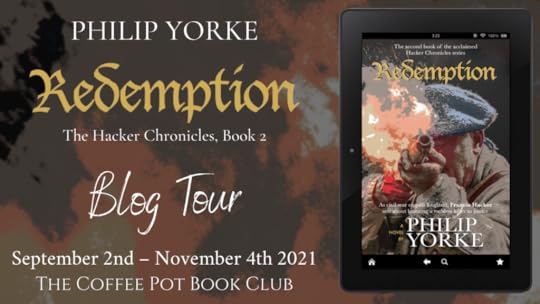
To follow the blog tour, CLICK Tour Schedule Page
HIGHLIGHTS: REDEMPTION
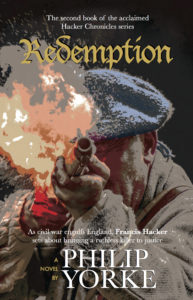
Redemption
(The Hacker Chronicles, Book 2)
By Philip Yorke
Saturday, the second day of July, in the year of our Lord, 1644, will be a day long remembered by the men and women committed to ending the reign of a tyrannical King. For on this day, the forces of Charles the First were crushed on the bloody fields of Marston Moor.
The calamitous defeat forces the increasingly desperate Royalists to intensify their attempts to bring about the immediate demise of their Parliamentarian enemies. This includes devising an audacious plan to assassinate the man they believe is key to the war’s outcome.
With the plotters ready to strike, Francis Hacker, one of Parliament’s most loyal soldiers, becomes aware of the conspiracy. With little time to act, he does everything in his power to frustrate their plans. But, alas, things start to unravel when brave Hacker finds himself pitted against a ruthless and cunning mercenary, a man who will resort to anything to achieve a ‘kill’.
Buy Links:
This novel is available with #KindleUnlimited subscription.
Universal Link  Amazon UK
Amazon UK  Amazon US
Amazon US  Amazon CA
Amazon CA  Amazon AU
Amazon AU  Philip Yorke
Philip Yorke

Philip Yorke is an award-winning former Fleet Street journalist who has a special interest in history. His Hacker Chronicles series, to be told in five fast-paced historical fiction novels, tells the story of Parliamentarian soldier, Francis Hacker.
Redemption, the second book in the series, is set during the period 1644-46 (during the first English Civil War), when events take a significant turn in favour of Parliament.
Philip is married, and he and his wife have five children. He enjoys relaxing to classical music, reading the works of Nigel Tranter, Bernard Cornwell, Robyn Young and CJ Sansom, and supporting Hull City FC and Leicester Tigers RFC.
He lives in Leicestershire, England.
Social Media Links:
Website  Twitter
Twitter  Facebook
Facebook  Instagram
Instagram  BookBub
BookBub  Amazon Author Page
Amazon Author Page  Goodreads
Goodreads
Why I love Belvoir Castle…
Belvoir Castle is a special place that evokes strong feelings in me whenever I visit, which I am prone to doing on the rare occasions when I get a moment to myself.
The castle, constructed boldly in such a way it totally dominates the landscape, is not the stronghold I refer to in Redemption, my second British Civil War novel about the life and times of Francis Hacker. That fortress was modernised and rebuilt at the beginning of the nineteenth-century when the newly married Duchess of Rutland (formerly Lady Elizabeth Howard) chose architect James Wyatt to rebuild Belvoir in the romantic Gothic Revival style that was popular at the time.
It is this very citadel (towering walls et al) we all enjoy today if we make a trip to the Vale of Belvoir.
No, the fortress Francis Hacker would have known in the 1600s was the second incarnation. Originally built by the Normans and referenced in The Doomsday Book, by 1555 it had been modernised and refurbished by Thomas Manners (the first earl of Rutland) using stone from Croxton Abbey and Belvoir Priory following their dissolution.
It was in the bowels of this citadel that Francis was incarcerated on two notable occasions – in November 1643 (after the surprise Royalist raid on Melton Mowbray) and May 1645 (when he was captured on the outskirts of Leicester, after the besieged city had fallen to a sustained Royalist assault) – and where he pined for his beloved wife, Isabelle, who lived less than five miles away in Stathern. Indeed, such is the castle’s prominence, it can be clearly seen from the village. One can only guess at the torment and feelings invoked in Isabelle during this period in her life as she looked up and gazed at Belvoir’s imposing turrets – and Francis’s agonies as he waited in his small cell to be freed and returned to his loved ones?
But it isn’t just the castle that is intriguing, for an important battle and skirmish were fought in its shadows during the first of the civil wars (1642-46).
Gervase Lucas, the castle’s fearless governor, used his guile to overthrow the Earl of Rutland’s lethargic and incompetent forces in 1643 to claim it for himself and his King. The brave Lucas is said to have spotted a window open and, realising there were no guards present, made his way into the castle’s grounds, climbed up the wall and through the window, and then marched to the front gates from where his fighting men were able to achieve a complete takeover without a drop of blood being spilled. In the coming years, Lucas, who was a highly accomplished soldier, organised lightning raids that frequently frustrated Parliament’s efforts.
On Sunday 29 October 1644, less than a mile away from the castle’s walls, Francis was one of the commanding officers of a Parliamentarian force (comprising the militias of Leicester, Nottingham and Derby) that routed a 1,500-strong Royalist force led by Sir Richard Byron. Almost a third of the cavaliers are taken prisoner during the engagement and as many as 60 Royalists are killed, many of them drowned as they flee the battlefield and fall into waters known as the Mill Pool.
During the fighting, Francis was wounded. But his bravery in the field won him the plaudits of his men and cemented his reputation as a formidable leader of cavalry.
Unable to help his stricken allies, Gervase Lucas and the Belvoir garrison would have witnessed the calamitous defeat from the safety of the castle’s impregnable walls. One can only imagine how that may have felt?
King Charles visited the castle on several occasions, and Princes Rupert and Maurice are reputed to have sought sanctuary here in the weeks following the Battle of Naseby, when the King’s fortunes suffered a devastating reversal that he would never recover from.
All these events – significant chapters in British history – took place in this enticing and awe-inspiring place. And, if you allow your mind to drift back in time, it is possible to sense the presence of these men and of the events that defined the period and shaped our nation.
From the castle there is an unimpeded near 360-degree view stretching for more than 20 miles in all directions. What an advantage this must have been to Lucas as he set about attacking Parliament’s supply columns as they snaked their way from the north to places like Nottingham and Leicester. It is little wonder Parliament was furious with the Earl of Rutland (father of Lord Grey of Groby, who is a key character in Redemption) when the castle was overrun so meekly. If the Earl’s men had held Belvoir, it would have been a wonderful base to attack Newark from and thereby secure large parts of Lincolnshire and Nottinghamshire.
Unfortunately for Parliament, Lucas held on to his prize for almost three years before negotiating a surrender at the beginning of 1646 that enabled him to march from the castle with his colours flying and without surrendering his weapons. This indicates the willingness of Parliament to bring a man who had been a thorn in its side into its peace.
So, if you have a passion for history, or you simply fancy a great day out looking at something that has several great stories to tell, get yourself to Belvoir Castle. Come rain or shine, it’s a wonderful place to visit. And, for me, it has that extra bit of significance that makes every visit so memorable.

@coffeepotbookclub
October 25, 2021
Jeanna Louise Skinner The Book Boyfriend Coffee Pot Book Club Blog Tour #TheBookBoyfriend #BlogTour #CoffeePotBookClub #Paranormal #TimeTravelRomance @jeannalstars @UKRomChat @maryanneyarde
It is my pleasure to feature Jeanna Louise Skinner as part of The Coffee Pot Book Club Blog Tour being held from October 25th – October 29th, 2021. Jeanna Louise Skinner is the author of the Paranormal/Time-Travel Romance The Book Boyfriend, which will be released by Violet Gaze Press/Saga Egmont on 27th October 2021 (340 pages).
Below are highlights of The Book Boyfriend, Jeanna Louise Skinner’s author bio, and an excerpt from her book.

To follow along on the tour, click Tour Schedule Page
HIGHLIGHTS: THE BOOK BOYFRIEND

The Book Boyfriend
By Jeanna Louise Skinner
“ Let us find solace in the quiet…”
Emmeline always dreamed of being an author, finding comfort in words and between the pages of her beloved romance novels, but a mental health diagnosis leaves her blocked and unable to write. Then she inherits a crumbling, second-hand bookshop from a mysterious old friend and Emmy discovers that magic is real and maybe her fantasies about the heroes in her favourite historical romances aren’t so far-fetched after all.
A handsome stranger–wielding a sword as dangerous as his Tudor past–appears in Emmy’s bookshop asking for help. Together they must race against time itself to lift the curse imprisoning him in an ancient book. But when growing threats to her safety are proved real and not another symptom of her illness, Emmy must learn to trust her own voice again. Can she find the words to save Jonathan and her shop before tragedy strikes on the fateful final page?
Romance-addict Emmy may be, but this damsel is about to kick distress into the Ever After.
Trigger warnings:
Mental health issues, panic attacks, grief, references to abuse, references to cheating, character taking medication, references to therapy, references to suicide, references to section, references to body image references, misogyny.
Buy Links:
Amazon UK  Amazon US
Amazon US  Amazon CA
Amazon CA  Amazon AU
Amazon AU

Jeanna Louise Skinner writes romance with a sprinkling of magic. The Book Boyfriend is her debut novel and she is currently working on a prequel. She has ADHD and CRPS, a rare neuro-inflammatory disorder, and she is passionate about writing about people underrepresented in Romance, especially those with disabilities and chronic health conditions. She’s also the co-creator of UKRomChat, a much-lauded, Romance-centric live Twitter chat. She lives in Devon with her husband, their two children and a cat who sounds like a goat.
Social Media Links:
Website  Twitter
Twitter  Twitter
Twitter  Facebook
Facebook  Instagram
Instagram
1567
The Dread Sweate has returned. The fireplaces burn strong and the court stifles in the cloying summer heat. It is said that death is swift, with few surviving once the sickness takes hold. We must endure the furnaces to prevent further spread. Miss Caroline Godwin is the youngest daughter of Sir Godfrey Godwin, chief physician to the Queen. She is lovely. At once come-hither, yet aloof. Her smile is radiant with the kiss of youth and her eyes reflect the waxing and waning of the flames. Her pretence is strong, yet the sharp rise and fall of her chest gives her away. Why else would she have agreed to accompany me to a private chamber? She is uncharacteristically unsure of herself. I watch as she takes a coquettish sip of wine and wonder if she will be like her older sister in bed.
“This blessed fire becomes unbearable, my lord. Might we not open a window?” She fans at her cheeks, rosy-stained and delicious. An apple ripe for picking and I am the very man to shake the tree.
“Ahh, my Lady, I apologise, but surely you understood your father’s instruction? We must do whatever we can to work up a clean and natural sweat.”
“There is nothing clean about cooking oneself. I feel like a goose dressed for Christmas dinner in July.”
I ignore the obvious invitation to compliment and instead make my move. “I hear you are quite the sportswoman. Maybe if you changed into something more suitable, you would partake in a game with me?” I hold up the dice for her to see.
“And why would my lord think I be unsuitably dressed for a game of tables?”
Time to roll the dice. I cross the room in two strides and lean toward her right ear.
“Because, my Lady, I would take great pleasure in licking the sweat from your bosom, as I lay your delectable body across my table.”
Her breath hitches and I lean out again to assess her reaction. The fire in her eyes is scorching, and I know I should be grateful if the good Doctor remains ignorant of exactly how we plan to interpret his wisdom.

@coffeepotbookclub
October 20, 2021
Helen Steadman Widdershins #Coffee Pot Book Club #Blog Tour #HistoricalFiction #Widdershins #Witches #Audiobook @hsteadman1650 @maryanneyarde
It is my pleasure to feature Helen Steadman as part of The Coffee Pot Book Club Blog Tour being held from October 18th – October 29th, 2021. Helen Steadman is the author of the Historical Fiction, Widdershins (Widdershins, Book 1) which was released by Impress Books on 25 June 2021 (370 pages; audiobook 8.5 hours).
Below are highlights of Widdershins, biographies for author Helen Steadman and narrator Christine Mackie, and Christine Mackie talking about the audiobook.

To follow the blog tour, CLICK Tour Schedule Page
HIGHLIGHTS: WIDDERSHINS

Widdershins
(Widdershins, Book 1)
Author: Helen Steadman
Narrator: Christine Mackie
The first part of a two-part series, Widdershins is inspired by the Newcastle witch trials, where 16 people were hanged. Despite being the largest mass execution of witches on a single day in England, these trials are not widely known about. In August 1650, 15 women and one man were hanged as witches after a Scottish witchfinder found them guilty of consorting with the devil. This notorious man was hired by the Puritan authorities in response to a petition from the Newcastle townsfolk who wanted to be rid of their witches.
Widdershins is told through the eyes of Jane Chandler, a young woman accused of witchcraft, and John Sharpe, the witchfinder who condemns her to death. Jane Chandler is an apprentice healer. From childhood, she and her mother have used herbs to cure the sick. But Jane soon learns that her sheltered life in a small village is not safe from the troubles of the wider world. From his father’s beatings to his uncle’s raging sermons, John Sharpe is beset by bad fortune. Fighting through personal tragedy, he finds his purpose: to become a witchfinder and save innocents from the scourge of witchcraft.
Praise for Widdershins:
The Historical Novel Society said of Widdershins: “Impeccably written, full of herbal lore and the clash of ignorance and prejudice against common sense, as well as the abounding beauty of nature, it made for a great read. There are plenty of books, both fact and fiction, available about the witch-trial era, but not only did I not know about such trials in Newcastle, I have not read a novel that so painstakingly and vividly evokes both the fear and joy of living at that time.”
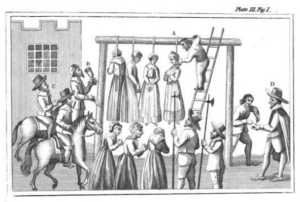
Hanged Witches from Ralph Gardiner 1655 book, “England’s Grievance”
Trigger Warnings:
Domestic abuse, rape, torture, execution, child abuse, animal abuse, miscarriage, death in childbirth.
Buy Links
Amazon UK  Amazon US
Amazon US  Amazon CA
Amazon CA  Amazon AU
Amazon AU  Audible Link
Audible Link  Blackwells
Blackwells
Waterstones  Kobo
Kobo  iBooks
iBooks  iTunes
iTunes  Foyles
Foyles  Book Depository
Book Depository
E-BOOK OF WIDDERSHINS REDUCED TO 99 CENTS

CLICK Universal eBook link
AUTHOR BIO: HELEN STEADMAN

Dr Helen Steadman is a historical novelist. Her first novel, Widdershins and its sequel, Sunwise were inspired by the Newcastle witch trials. Her third novel, The Running Wolf was inspired by a group of Lutheran swordmakers who defected from Germany to England in 1687.
Despite the Newcastle witch trials being the largest mass execution of witches on a single day in England, they are not widely known about. Helen is particularly interested in revealing hidden histories and she is a thorough researcher who goes to great lengths in pursuit of historical accuracy. To get under the skin of the cunning women in Widdershins and Sunwise, Helen trained in herbalism and learned how to identify, grow and harvest plants and then made herbal medicines from bark, seeds, flowers and berries.

The Running Wolf is the story of a group of master swordmakers who left Solingen, Germany and moved to Shotley Bridge, England in 1687. As well as carrying out in-depth archive research and visiting forges in Solingen to bring her story to life, Helen also undertook blacksmith training, which culminated in making her own sword. During her archive research, Helen uncovered a lot of new material and she published her findings in the Northern History journal.
Helen is now working on her fourth novel.
Social Media Links:
Website  Twitter
Twitter  Facebook
Facebook  Instagram
Instagram  Amazon Author Page
Amazon Author Page  Goodreads
Goodreads  YouTube
YouTube
The new audiobook of Widdershins is narrated brilliantly by the talented actor, Christine Mackie, from Downton Abbey, Coronation Street, Wire in the Blood, and so on.
Below is a video of Christine Mackie talking about the audiobook.
NARRATOR BIO: CHRISTINE MACKIE

Christine Mackie has worked extensively in TV over the last thirty years in well-known TV series such as Downton Abbey, Wire in the Blood, Coronation Street, French & Saunders and The Grand Theatre work includes numerous productions in new writing as well as classics, such as A Midsummer Night’s Dream, Comedy of Errors, Richard III, An Inspector Calls, and The Railway Children. In a recent all women version of Whisky Galore, Christine played three men, three women and a Red Setter dog!
 Instagram: @coffeepotbookclub
Instagram: @coffeepotbookclub
October 18, 2021
Author Interview Luciana Cavallaro #HISTORICALFANTASY #ACTIONADVENTURE @CLUCIANALUCIANA @LINNEATANNNER
It is my pleasure to introduce Luciana Cavallaro, an Australian author who graciously accepted my invitation to interview her. She recently launched the historical fantasy, action/adventure book, The Guardian’s Legacy (Coin of Time Book 1).
I’ve followed Luciana for several years and share her love of mythology. I’ve enjoyed reading all her books which interweave Greek mythology and time travel into the tales. More information about Luciana Cavallaro and her work follows the interview below.
AUTHOR INTERVIEW LUCIANA CAVALLARO
Would you provide an overview of books that you have published? Is there a common theme from Greek mythology that you like to convey to readers?
I have a published short story collection written from the point of view of the female protagonist based on well-known Greek myths. In the Servant of the Gods series, I currently have two books published, set in 600 BCE, and it is about a 21st Century man who is pulled from his timeline and thrust back into the past to prevent the rise of Christianity. The main character, Evan, is Zeus’ son. However, he is not at all happy about his current situation and is argumentative and angry.
I studied and have been a student of ancient history for many years, fascinated by ancient cultures and in particular Ancient Greece and mythology. My first introduction to Greek mythology and history stemmed from the legend of Atlantis. From there, I wanted to share what I learnt through stories.
Please tell us more about your most recently released book, The Guardian’s Legacy (Coin of Time Book 1). What other books are similar to yours?
The Guardian’s Legacy was first written as a short story, Herodotos’ Coin, for Australian author Sally Odgers, who included it in a publication she compiled. It is about a rare object with unusual properties and supernatural qualities, that was later made into two coins, to hide its true nature. The first owner, Herakles, found it and learnt of its unique ability. Later, Nik’s family become the guardians of one of the coins and keep it hidden for thousands of years.
Books by Dan Brown and Wilbur Smith are similar, as are those by Raymond Khoury, James Rollins, and Steve Berry.
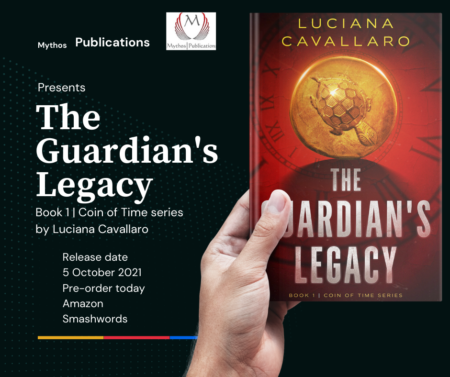
What inspired you to write about two coins minted by Heracles that, when combined, have a secret power that could potentially harm the world if they fall into the wrong hands?
That is a good question. The idea came from an object that was sent to me by Sally Odgers, a Greek coin. I sat on it for a number of weeks trying to work a story that centred around a coin. I knew I wanted the story set in the present, but wanted to added mystery and a little supernatural into the plot. Plus, I read lots of thrillers and mysteries, and love anything with artefacts. I remember reading about the Spear of Destiny, and other such holy artefacts, and thought why not a coin with magical attributes.
Why two coins? It’s that ole trope of what would you do if you had the power to use the coins? Would you use it for self-gain and lose yourself to the power it gives you, or to help others, and see the power of change and good it makes? We make these decisions on a daily basis, some potentially life-changing and steering you in a different direction, or a little blip on the radar, and you don’t notice what happens until days, weeks or months later.
How much research was involved in writing your books? How did you go ABOUT researching ancient coins in preparation for writing The Guardian’s Legacy?
I do a lot of research for my books, mainly as I love learning about the cultures and history, and most importantly, I want to provide readers with as much authenticity as I can about the time, location and events of the time. Of course, with fiction, there is creative license, otherwise it wouldn’t be much of a story. Like mythology, there is a basis/hint of truth in the stories.
In researching about coins for The Guardian’s Legacy, I wanted to find out when, where and who minted the first coin. I have a nice collection of history books that I checked, then researched the web, cross-referencing lots of sites, verifying sources and dates. It did take time, as I am a bit of a perfectionist when it comes to locating information in sources, something that I also encourage and demonstrate in my classes.
Are there any similarities between your main character, Nicolaos Zosimos (Nik), in The Guardian’s Legacy and yourself?
There are some similarities between Nik and myself. We’re both teachers and I did teach at an all boys’ independent school in Perth. We both have European heritage—Nik’s Greek and mine Is Italian, though I have a strong feeling somewhere in my family’s lineage, we may have Greek ancestry. Plus, a love of ancient history, which Nik gets to teach and I don’t, as my school doesn’t offer it as a subject. That is the extent of our similarities.
Do have a favorite sub-character in The Guardian’s Legacy? If so, why?
That is a hard question to answer, each of them having different qualities I like. If I have to choose, it’s most likely Detective Sauveterre. She has an inner strength that we will get to see in the next book.
How many additional books do you anticipate in the Coin of Time series? Can you give us a hint on where the adventure will take Nik?
The Coin of Time series is a 5-book series. Well, Nik is in charge of the story and he does need to rescue his Papou, so we’ll see him traversing across Europe to avoid being captured.
As an Indie author, what advice would you give to writers who are considering to independently publish their work?
Do your research and work out whether you have the resilience and patience to publish independently. Working full-time and writing takes endurance and passion, and if you don’t have a work ethic, then perhaps it’s not the best route to take.
I just wish someone had told me how much work would be involved and the process to be an independent writer/publisher. Not sure that would have changed my own path, but it may have helped in some of the decisions I made over the years.
How do you balance your life as an author and your day occupation as a teacher?
This has been difficult, juggling and balancing my job as a teacher and finding time to write. I set time aside in the evening to write, and sometimes that doesn’t happen, depending on what time I get home and prepare for dinner, etc. I have writing targets and try to achieve them. During the school holidays, I set days for my writing, and days for downtime and socialising. The school terms are so busy, so when the holidays come, I write as much as I can.
Are there any life experiences that profoundly impacted you and inspired you to be an author?
I had a bad car accident and couldn’t work for three months. My mental health suffered, and I found writing helped deal with a lot of angst and anxiety. Writing allowed me to express what I was feeling and seeing the words on the page helped to heal. It was from then on, and after my trip to Europe, I was inspired to write.
How are ancient history and mythology relevant to modern day?
I believe ancient history and mythology are more important than ever today. Our past provides a road map from where we’ve been, and guides us into the future. We have the opportunity to learn so much from the amazing civilisations around the world, what they have achieved with much less than we have today. The lessons of the past are also ours today; we just need to listen and heed their wisdom. Myths were and still are lessons for people, to help guide and provide seeds of growth, where morals and ethical behaviours are illustrated.
What might we be surprised to learn about you?
Well, before I started school my first spoken language was Italian and had difficulty with English. Unfortunately, I don’t speak Italian today. Lost the ability after I began school. I daresay it is somewhere in my long-term memory, but most likely some psychological block is preventing me from remembering how to speak it.
AUTHOR BIO: LUCIANA CAVALLARO
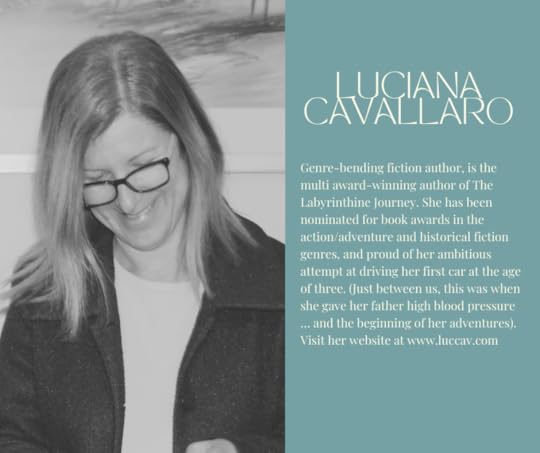
You can connect with her via:
Website  Twitter
Twitter  LinkedIn
LinkedIn  BookBub
BookBub  Amazon Author Page
Amazon Author Page  Goodreads
Goodreads  YouTube
YouTube
ACCURSED WOMEN
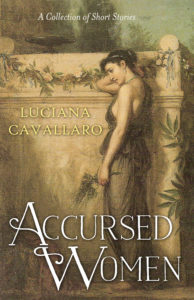
Five stories, five women, five legends.
Phaedra, a Minoan princess, marries out of duty and to safeguard her precious home. She falls in love with Hippolytos, her husband’s son and asks the Goddess Aphrodite for help. He spurns her affections.
The Trojan War, one of history’s greatest stories ever told. What if the legend as told is wrong? History is told by the victors, and facts changed to twist the truth. Is it possible Helen of Sparta never went to Troy?
Hera, Queen of the Gods, is the most powerful goddess on Mount Olympos. For the first time ever in a candid interview, Hera shares what it’s like to be a goddess and wife to Zeus, the King of the Gods.
Created by the gods as a gift to humanity, Pandora is the first woman on Earth. Did she know what Zeus intended when he presented an urn as a wedding dowry to her husband? Neither she nor Epimetheus knew what it contained, but they were told never to open it.
All Medousa wanted was a life of love and acceptance but one fateful night it changed. While she’s alone in the Temple of Athene tending to the sacred fire, Poseidon pays a visit. No human can stop an immortal from taking what they want.
CLICK BUY LINK
SEARCH FOR THE GOLDEN SERPENT (Servant of the Gods Book 1)
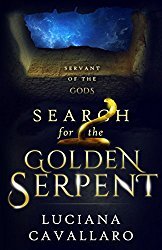
A true page-turner, in a similar vein to Wilbur Smith and David Gemmell, is an action-packed adventure story catapulting a reluctant hero from one dangerous encounter to another.
Evan has been having some very strange dreams.
The Perth-based architect dismissed an unexpected phone call from an entrepreneur in Greece, asking him to restore his family home, as the ravings of a crank. Until, that is, the dreams begin, each more vivid than the last. A dream encounter with a mysterious character called Zeus sees him catapulted back in time to 500 years before the birth of Christ.
Evan finds himself quickly embroiled in a plot to prevent the birth of Christianity, an unwilling player in an epic struggle between the old gods and the new, fighting for his life.
CLICK BUY LINK
THE LABYRINTHINE JOURNEY (Servant of the Gods Book 2)
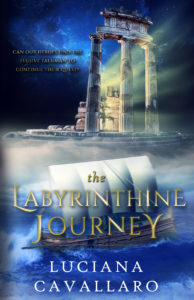
A mysterious message. A mission from the gods. Can he turn back the clock to prevent his family’s extinction?
Evan’s new life is in ancient Greece, and he fears he’ll never see his home again. Ripped from his 21st century world, his only way to return to the present is to collect god-saving sacred relics for his father Zeus. But to locate them means braving perilous seas and staring down death in search of a legendary oracle.
During their voyage, Evan and his companions come face-to-face with mythical creatures, fabled warriors, and treacherous sorcery. But despite the dangers all around them, Evan’s deadliest threat may be bound to him by blood…
Can Evan complete his quest before he and the gods are lost to history?
The Labyrinthine Journey is the second book in the fast-paced Servant of the Gods historical fiction series. If you like well-researched landscapes, suspenseful twists and turns, and mythic battles, then you’ll love Luciana Cavallaro’s heroic odyssey.
THE GUARDIAN’S LEGACY (Coin of Time Book 1)
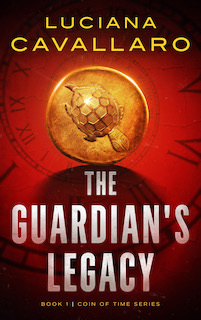
A three-thousand-year-old magical coin, the disappearance of an old man, fanatical neo-Nazis, and the hunt by Interpol, merge in this gripping story of an ancient cover-up, and the transition of an ordinary man into the guardian of the most powerful coin on earth.
High school teacher Nik Zosimos, leads an uncomplicated life until he receives a cryptic phone message from his grandfather, Iasos. He hurries to his grandfather’s finding him relaxed and pleased to see him. A few beers later, Nik leaves his grandfather’s place, stupefied and astounded. Iasos has a secret, one that dates back to the time of Herakles.
But that was just a myth, wasn’t it?
If you like Dan Brown and Wilbur Smith books or enjoys action, fast-past dramatic shows similar to National Treasure and The Librarians, then you’ll love The Guardian’s Legacy. Award-winning author of Historical Fantasy/Adventure, Luciana Cavallaro, pens a thrilling mystery. Click below on one of the retail sites to find out how Nik’s life changes.
CLICK BUY LINK
October 14, 2021
Welcome to Day 5 of #RRBC’s October #SpotlightAuthor #PatGarcia @pat_garcia! @RRBC_Org @RRBC_RWISA @Tweets4RWISA #RRBCSA
It is my pleasure to host Day 5 of the Rave Reviews Book Club (RRBC) spotlight author, Pat Garcia, for the month of October. She is a dedicated member of RRBC/RWISA and serves on the Editorial Staff of The Pipeline Magazine as Chief Staff Writer. Pat is also an active member of the Tweet Support Team. She currently lives outside of the United States as an Ex-Patriate and enjoys living on the European Continent.
Below is a guest post by Pat Garcia, her author bio, and highlights from her book,
DAY 5 READING AND ITS IMPORTANCE TO MEEven though I had a strong desire to write, I didn’t have the discipline to stick with it. Not having any writers in my family and coming from a family where I was the first to receive a high school diploma, it was hard for them to accept that writing and music were decent professions that you could make a living from in the Deep South. So, they gave me very little encouragement.
At that time, being the chief dishwasher in a restaurant was considered a high achievement. With the schools integrating in my hometown, I began to dream that maybe I could escape the status quo. My English teacher, Carol Shepard, made a difference in my life. She gave me my first book and opened my heart to Camus, Wordsworth, the Bronte sisters, Victoria Holt, Agatha Christie, Samuel L. Clemens, Faulkner, John Gardner, and many others. I was like a sponge. I soaked in every book that I got my hands on, and at a certain point, I began to write again.
Unfortunately, I didn’t know about Frank Yerby, the first African American novelist born and raised in Augusta, Georgia, until I came to Germany. The Europeans are familiar with Yerby, and still today, many of them are reading his books.
However, I was knocked down again when I listened to another teacher who taught writing. After reading one of my stories, she said it was useless for me to take her class and recommended I move to the Home Economics class, where I could learn something that would be helpful for me to get a job. I was so discouraged that I stopped writing again, but I kept on reading. No matter what it was, fiction or non-fiction, if I got it into my hands, I read it. During this time, I also began journaling.
These days, I take the time to study book award winners and all the nominees. I invest my time examining style and sentence structure, tone, and how they build up the drama, the tension that keeps a person reading. This has helped me to find my voice in the murky waters of writing.
I smile when I read my first published book, Turn The Light On, because I can see my main character, Della, standing at the window, angry. Her stubbornness comes out because she’s fighting her own feelings of relief that Alessio is alive and the realization that she loves him. It’s that southern flavor of the strong-black-woman-syndrome that so many African American women in the Deep South suffer under.
The snippet below from the book, can probably give you a better picture of what I am referring to:
A t the entrance, Della stopped. A familiar, dry lemon-lime scent surprised her, and the hair on her arms rose. She shivered and took a deep breath. That smell – she’d savored it every time he was near. ‘It’s him,’ she thought. ‘He’s here.’ Infuriated that he would have the gall to break into her apartment, Della’s fighting spirit reared its stubborn head. She refused to acknowledge him. Despite her fury, tears of relief streamed down her face. Steeling the excitement inside of her, she strolled over to the huge glass window, and looked out toward the empty penthouse in the building across from hers.
Della confessed to herself that her involvement with the man sitting somewhere in her living room, was more profound than she had been willing to admit, even to herself. Having given him her heart, she hoped that he was her anonymous donor.
AUTHOR BIO: PAT GARCIA
 Pat Garcia can’t remember a day when she didn’t desire to write. At the age of three, Pat wrote her first story. No one could understand it because she hadn’t learned to write. So, she read the scribble on her paper to whoever would listen. Born in Blythe, Georgia, (USA), she is also a musician, singer, and songwriter and has released five CDs.
Pat Garcia can’t remember a day when she didn’t desire to write. At the age of three, Pat wrote her first story. No one could understand it because she hadn’t learned to write. So, she read the scribble on her paper to whoever would listen. Born in Blythe, Georgia, (USA), she is also a musician, singer, and songwriter and has released five CDs.
Social Links:
HIGHLIGHTS: TURN THE LIGHT ON
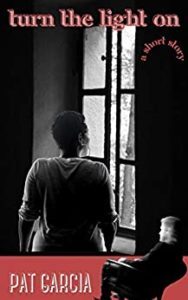
Turn the Light On
by Pat Garcia
Would you ever accept a dinner invitation to meet a stranger who never spoke one word to you during your time together? Would you accept that you could not even sit at the same table with them? How about, you don’t even know their name and you continue this “game” for months?
Meet Della Cartwright. A superstar at what she does professionally, but when the tall, mysterious, Italian stranger, Alessio Terracina, enters her world, she begins to question her judgment and everything about her.
In this short story which takes place over the course of one day, this otherwise savvy businesswoman is led into making decisions that could jeopardize her professional life and maybe even cost her her freedom. But the greatest danger…just might be to her fragile heart.
Buy Links:
Available on KindleUnlimited.
Amazon US  Amazon UK
Amazon UK  Amazon AU
Amazon AU  Amazon CA
Amazon CA  Amazon DE
Amazon DE
Thanks for supporting the RAVE REVIEWS BOOK CLUB’S October Spotlight Author! To learn more about this author and all the wonderful perks she is receiving under this spotlight, please visit the RRBC SPOTLIGHT AUTHOR forum.



